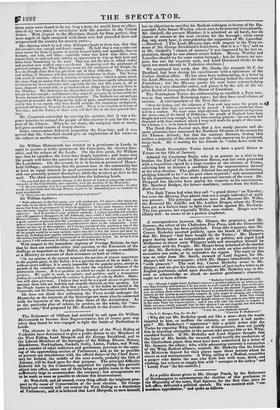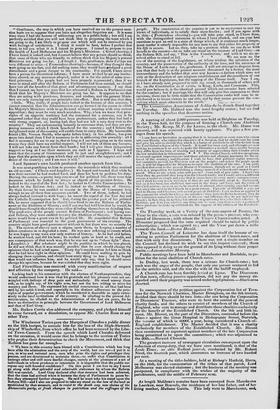At a public dinner given to Mr. George Peach, by
the Reformers of Northampton to commemorate the election of that gentleman to the Mayoralty of the town, Earl Spencer, for the first time since he left office, delivered a political speech. He was received with 4, tre- mendous approbation," and spoke as follows. " Gentlemen, the way in which you have received me on the present occa- sion leads me to auppose that you have not altogether forgotten me. It is some time since I had the honour of addressing you as a public body ; but still I am perfectly satisfied that you will not think that in proposing the tout which I am going to do, I am likely to prapose one which will not he received by you with feelings of satisfaction. I think it would be best, before I preface that toast, to tell you what it is I intend to propose. I intend to propose to you the health of Lord Melbourne and his Majesty's 'Ministers. ( Great cheering.) I have heard it indeed said, but I cannot believe that any person should so think, that some of those who are friendly to reform think that his Majesty's present Ministers are going too far. (A laugh.) But, gentlemen, their f elings are very different to inine—( Tremendous c)ieering)—because, if they thought they were going on too fast, and did nothing more, they would have produced a great disturbance and a great danger to the community. For myself, I have never been a person for theoretical reforms; I have never wished to see any institu- tions altered, or any measures adopted, unless it is for the relief of some prac- tical grievance. The people had not been properly la presented ; then if we were to stand still after the Reform of Parliament had been carried, we should have lost all the benefits of that great and advantageous measure. I say then that !cannot see how any man that has advocated a Reform in Parliament can think that his Majesty's Ministers are going too far. It appears to me that they are acting with prudence, firmness, and wisdom, and the present Minis- ters are only carrying out our principles into effect. But is said also that they . 3 little. Why, really, if people have looked at the history of this country, I sfannot conceive that the Administration can go forward in the course in %%ilia his Majesty's Ministers wish to go forward without meeting with very serious opposition ; they must be very much mistaken. Why, what we knew that prin- ciples of an opposite tendency had the command for a century, can it be supposed either that they could have been predominant, unless they had had a very strong support, or, having had, they had not left a very deep root in the country ? They are endeavouring honestly to overcome that, and they are pro- posing measures which I think beneficial for the country ; and I bel:eve the enlightened state of the country will enable them to carry them. My honourable friend (Mr. Vernon Smith, who spoke before him), in his address, has gone more into detail than I feel it necessary to do in addressing this assembly : all I feel it necessary for me to say is, that so long as I see them going on in the same course they shall have my cordial support. I will not ask of them any favours; I will not take any favour front their hands; but I will give them independent support so long as I see their measures are such as I approve. I hope and trust that the course of Government will be just and straightforward ; and I hope that the principles upon which they act will receive the support and confi- dence of the country; and I am sure it will."
Lord Spencer's own health produced another speech from him.
It was most gratifying to him to perceive the warmth in which they received an old servant. ( C'heers and laughter.) He hoped and trusted that while he was their servant he had worked hard, and done his best to perform his duty. During the course—a pretty long coutse—of his political life, there were four measures which he looked to always as objects of the greatest desire. He looked to the repeal of the Test Act ; he looked to Catholic Emancipation ; he looked to the Reform Act ; and he looked to the Abolition of Slavery. By their favour he was enabled to remain in the House of Commons long enough to see all these four measures carried. Two of them, indeed, he had always looked forward to with hope; he meant the repeal of the Test Act and the Catholic Emancipation Act. But, during the greater part of his political life, he never supposed that he should have lived to see the Reform of Parlia- ment or the Abolition of Sl-avery; andif any one had told him that he would, he should have thought that they were either deluding themselves or deluding him. The good sense of the people-carried Reform of Parliament ; and having car- zied Reform, they were enabled to carry the Abolition of Slavery. These mea- sures would form a great :era in his political life. He considered that Reform of Parliament was essential to the good government of the country. The country might have good government without it, but there was no security for it. The system of slavery cast a stigma upon them, in keeping a number of fellow-creatures in so degraded a state. He was now referring to events which
he was happy to say were now only matters of history. As he had said before, he worked hard, awl did his best ; be worked quite as hard as he could, and one consequence of that work was, that he was not up to "show fight" then.
(Laughter.) But whatever might be the position in which he was placed, be did not think that it was morally possible that he ever should change the opinions that he had acted upon. Every day's consideration led him to think that he had been right in those opinions. He could have nothing to gain by changing those opinions, and should have every thing to lose ; but he hoped that would not influence him, and he would only say, that he should never change his opinions, because he was satisfied that they were right.
Earl Fitzwilliam was received with every manifestation of respect and affection by the company. He said
Looking back to his connexion with the electors of Northamptonshire, they would understand how it was that his gratitude and his pleasure were not un.
mingled with feelings of deep pain and melancholy. He stood among them reft, as he might say, of his right arm, but not the less willing to serve his country and them. He expressed his cordial concurrence in all that had been said by his noble ft iend, and especially in his distinct adherence to the prin-
ciples of popular government, which he considered it desirable to apply exten- sively to the local institutions of the country. In alluding to the present Ad.
ministration, he alluded to the Administration of the last six yews., for he knew no distinction in principle between the Government of Lord Melbourne and that of Earl Grey.
Mr. Raikes Currie also addressed the company, and pledged himself to come forward, on a dissolution, to oppose Mr. Charles Ross or any other Tory.



























 Previous page
Previous page